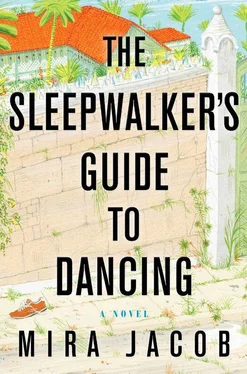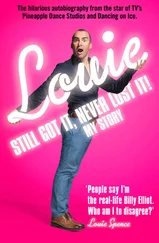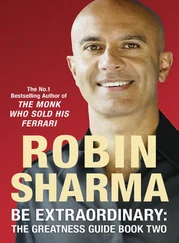“Oh yeah?” Dimple asked, a little more excited than she would have let herself be sober.
“Yeah.” He bent down, looking her square in the eye for a moment before thumping the door twice, backing up and walking away.
“Now that,” Amina said, waiting until he was out of earshot, “is definitely a date.”
It was late by the time Amina arrived home, later still by the time she got the truck unpacked. The film and the camera came out first, along with her light meter, and then she went back to pull Jose’s envelope from under the seat, holding it flat under her arm. The rain had cleared just enough to let some moonlight into the apartment, and she kept the lights out inside, peeling the dress off and letting it slide to the floor. She put the kettle on for tea.
In her bedroom, she felt around the floor for her sweats, sliding one leg then the other into the sensible black fleece and then looking at herself in the dark, in the mirror. She looked like she had come to rob her own house. In the kitchen, the kettle screamed.
Mint. Always mint, always the red mug. She grabbed the envelope with the photo in it on her way back to her room.
A whiff of cedar rushed out as she opened the closet. She tugged the light on, walked in. Boots and shoes lined either side of her like cobblestones, and she made a path through them, reaching for the pile of coats in the back. She lifted them.
And there it was, smooth and small as a child’s coffin. The russet wood glided under her hand; the tiny brass handles were cool on her fingertips. In Montana, the woman who sold her the antique flat file laughed at the two hundred dollars Amina had offered, telling her she could never accept that much for “drawers that won’t hold a damn thing.” When Amina told her they were for pictures, the woman laughed again, and took the money.
One by one Amina opened the drawers, pulling out the contents in order. She moved methodically, careful not to look down. It was important not to look down. It was important to be ready.
When every drawer was empty she walked out of the closet and back to the window seat, and placed the picture from Jose on top. She looked at it again for a long minute, staring at the scuffs in Grandmother Lorber’s shoes before flipping it over.
Underneath was Dara Lynn Rose, on the morning of her second wedding, her hand wielding a large hairbrush. She was screaming, her teeth bared like a tiger’s, thin strands of spittle hanging from them. Seconds later she had chucked the brush at her husband-to-be as he fled the room. (“I’m superstitious,” she had explained to Amina later. “My first husband had a heart attack chasing a black cat off the lawn.”)
The next was Loraine Spurlock, looking up at her stepfather with adoring eyes. He bent to kiss her, his mouth open, his tongue lying in it like a wet animal.
Then came the McDonald sisters, Jeanie and Frances, their four hands gripping a just-thrown bouquet, splitting the baby’s breath with determined fingers. They smiled through jaws hard with determination.
Amina moved on to Justin Gregory, the five-year-old ring bearer who had been told he couldn’t leave once the ceremony started. He stood behind the bride and groom, staring up at them with a tiny pillow in his hands, a wet stain spread down the front of his crotch. A puddle shimmered at his feet.
Wide-lipped Angela Friedman and her new son-in-law greeted Amina in the next shot, her fingers digging into his neck as he kissed a bridesmaid on the cheek. Then it was the gray coil of Grandpa Abouselman, legs folded like newspaper against his wheelchair while couples danced in the background.
Amina lifted picture after picture, soothed by the rise of a lip, the splay of fingers, the stillness of passing disasters. She knew them well. She felt images rise off the page, the lines of one bleeding into the next until hands turned into flowers and veils became windows. Her heart unbuckled for the familiar faces, their familiar pains. She shuffled through them slowly until at last she was looking at the satin-covered knees pressing the ground next to a toilet, the bouquet on the tile floor. She stared at this one for long seconds, her fingers pressing against the edge. And then the stall turned into the underside of a bridge, the bouquet into a falling man. She was looking at Bobby McCloud.
The George Washington Memorial Bridge, more commonly known as the Aurora Bridge, has been an anomaly in Seattle since its construction in 1932. In a city where eight-lane highways have been avoided in favor of two-lane roads that break for the rise of drawbridges between sweetly named neighborhoods — Fremont, Queen Anne, Ballard — it has always been violently off scale, looking from below like some terrible, sky-slung hammock. Touted as the final link in the Pacific Highway, it became the destination of choice for Seattle’s suicidal before it was even completed. The first person to jump off the bridge did so in 1932, one month before its opening to commemorate George Washington’s birthday. The 176th person arrived on August 26, 1992.
August in Seattle: an eternity of dusk that hints at Greek mythology, a sun setting so slowly over the Puget Sound that everyone looks like immortal versions of themselves. On August 26, 1992, it made them want their picture taken.
“Just one quick one, okay?” The Korean guy standing in front of Amina was too small for his cargo pants.
She looked at her camera apologetically. “I’m actually on assignment for the Post-Intelligencer .”
“Great.” He smiled and threw his arms around the two women at his sides. “Cheese!”
Amina did a quick calculation in her head (time explaining job versus time taking picture) and hit the shutter release. Fine. Done. She avoided eye contact with anyone else as she walked across the deck of the Crystal Blue , fighting the claustrophobia that crept into her lungs when on a yacht.
This particular yacht was teeming with the young programmers and developers of Microsoft. If it was jarring to see other kids just out of college having their success celebrated with an evening of play on the Puget Sound, it was downright annoying not to understand them. What on earth was a Linux? The very idea that something called C++ existed made her want to drink, but she was not there to drink, she was there to capture Seattle’s newest elite, their hoodied shoulders and chipper smiles.
“Give us a feel of the event,” the photo editor’s new assistant at the P-I had said, as though Amina would be attending a cashmere sweater. She had wandered around overwhelmed. She hadn’t found her shot yet, and now, crawling through the locks and canals on the way back to Lake Washington, she could feel her need to get off the boat as sharply as a full bladder.
“So fucking cool, right?” a guy with orange shorts said to his friend, pointing at the Aurora Bridge in front of them. “I can never get over how cool that looks. It’s so, like, Legoland, right?”
“Totally,” the friend agreed. “Majorly Legoland.”
Amina had slipped behind them, trying to get the right angle on their beers raised in toast to the cantilevered spine, when she saw the man. He was standing in the middle of the bridge, dressed in yellow with white on his face. A clown. This is what she thought at first. She zoomed in and saw a feathered headdress. She took the picture.
The guy in the orange shorts turned around. “Hey, didn’t see you. We should turn around, no?” He flashed her a smile.
“No … I …” She pointed at the bridge. “I was taking a picture of that guy.”
Orange Shorts followed her finger. “The guy cleaning the bridge?”
“I don’t think he’s cleaning it.”
Читать дальше












